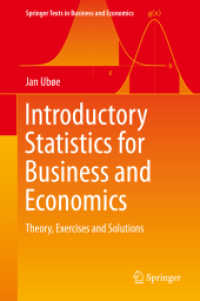- ホーム
- > 洋書
- > 英文書
- > Politics / International Relations
Full Description
Campaign organizers and the media appear to agree that voters' perceptions of party leaders have an important impact in elections: considerable effort is made to ensure that leaders look good, speak well, and that they are up in the polls. In contrast, the academic literature is much more divided. Some suggest that leaders play an important role in the vote calculus, while others argue that in comparison to other factors, perceptions of leaders have only a minimal impact.
This study incorporates data from thirty-five election studies across seven countries with varying institutional environments, and takes both a broad and in-depth look at the role of leaders. A few noteworthy conclusions emerge. First, voters evaluate leaders' traits in terms of two main dimensions, character and competence. Second, voters perceive leaders within the framework of a partisan stereotype in which the party label of the leader imbues meaning; more specifically, leaders of Conservative parties are seen to be more competent while Left leaders are seen to have more character. Third, and most importantly, leaders matter: they affect voters' decisions and have a discernible effect on the distribution of votes in an election. Fourth, there are consistent differences in the perception of party leaders according to voters' level of political sophistication. While all voters evaluate party leaders and consider leaders in their vote calculus, the more sophisticated do so the most. This book argues that personality plays an important role in elections, and that in a healthy democracy, so it should.
Comparative Politics is a series for students, teachers, and researchers of political science that deals with contemporary government and politics. Global in scope, books in the series are characterised by a stress on comparative analysis and strong methodological rigour. The series is published in association with the European Consortium for Political Research. For more information visit: www.essex.ac.uk/ecpr
The Comparative Politics Series is edited by Professor David M. Farrell, School of Politics and International Relations, University College Dublin, Kenneth Carty, Professor of Political Science, University of British Columbia, and Professor Dirk Berg-Schlosser, Institute of Political Science, Philipps University, Marburg.
Contents
Introduction ; What Information do we have about How Voters Perceive Party Leaders? ; The Two-Dimensional Structure of Traits ; The Impact of Voters' Characteristics on the Evaluations of Party Leaders ; The Impact of The Partisan Stereotype ; The Impact of Party Leaders' Traits in Elections ; Party Leaders in Different Contexts: The Role of Political Institutions ; Conclusion ; Appendix A: Methodological Notes ; Appendix B: Data, Question Wording, and Coding Information ; Appendix C: Missing Data and the Challenge of Exploratory Factor Analysis ; References








